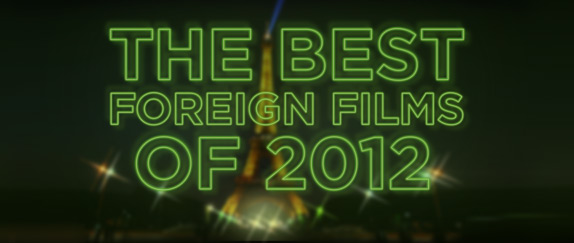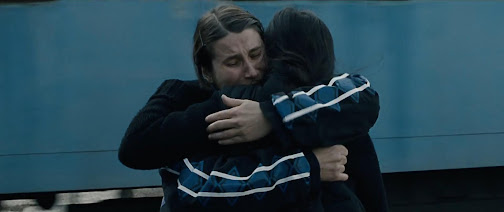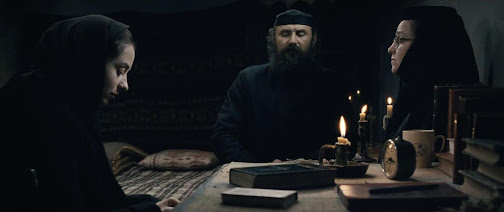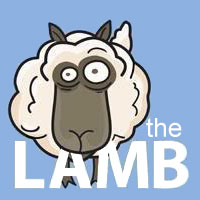Beyond the Hills • După dealuri (2012)


Genre: Drama
Director: Cristian Mungiu
Starring: Cosmina Stratan, Cristina Flutur, Valeriu Andriuta, Dana Tapalaga
Language: Romanian
Duration: 150 min.
Summary:
A drama centered on the friendship between two young women who grew up in the same orphanage; one has found refuge at a convent in Romania while the other tries to convince her to leave and return with her to Germany where she now works.
Beyond the Hills is a film written and directed by Cristian Mungiu, inspired by a pair of non-fiction novels by Romanian writer Tatiana Niculescu Bran. It premiered in competition at the 2012 Cannes Film Festival, where the Nanni Moretti led jury awarded it the prizes for Best Screenplay and Best Actress, the latter presented ex aequo to first timers Cosmina Stratan and Cristina Flutur.
It's been a long but worthwhile wait for Romanian New Wave director Cristian Mungiu's follow-up to his 2007 Palme d'Or winning 4 Months, 3 Weeks and 2 Days. The setting this time around is different, taking place in the present day instead of the Communist era, but the film is no less severe, as he once again explores a fascinating and heartbreaking bond between two young women in an oppressive environment.
Young novice Voichita (Stratan), who lives in a remote Orthodox monastery, receives a visit from her childhood friend Alina (Flutur). They grew up together in an orphanage and shared a very close relationship. Just how close we are never actually told, but enough clues are given to infer that they were once lovers. Alina now lives and works in Germany, and has returned to Romania expecting Voichita to come back with her, but she has found solace and comfort in her faith, here among her fellow sisters and Father (Valeriu Andriuta), and is reluctant to leave with her old friend.
Mungiu takes his time to carefully immerse us in the bleak surroundings of the monastery. A rough collection of wind battered buildings, hidden away somewhere in the vast rolling Romanian hills. It's not an inviting place, with no electricity and no running water, and the skies are perpetually grey, but the harshness is rendered with a strange muted beauty by Oleg Mutu's expert widescreen cinematography, which makes it all very captivating. Using of course that distinctly Romanian style of allowing long patient shots of mundane daily life and routine ample time and space to play out naturally, Mungiu though, directs these scenes in a manner that is unique and truly remarkable.
The way he stages the action is at once gripping and unsettling, even when the characters are barely moving and the camera remains still, there is always so much going on emotionally and psychologically within the frame. Yet these are not at all virtuoso sequences of powerful dialog or elegant choreography. He's not interested in dazzling the audience with artistry, just presenting very simple moments of subtle cinematic mastery, delivered with a hypnotic rhythm that totally pulls you entirely into that world. It's two and a half hours long, but everything comes together so perfectly that time just isn't a factor. In fact some parts were so engrossing that they seemed to pass by too quickly.
He also succeeds brilliantly in the casting. Flutur and Stratan give magnificent performances in their debut appearances. Hopefully winning at Cannes opens up some doors for the pair because they really impress here and I'd love to see more. They have great chemistry, and their scenes together make us easily believe that they've known each other their entire lives, but I think they are even stronger individually. Both of them equally command our attention in very different ways. Flutur exhibits a fiery raw intensity that is terrifying and at times agonizing to watch, and Stratan is the opposite, with her soft features, quietly spoken words, and subdued emotions, but just as tragically affecting.
What's also notable is Mungiu's careful balancing of the film's message. Religion is not exactly shown in a flattering light, but it's not a condemnation either. The same goes for the other bureaucratic public institutions encountered in the screenplay. There's a lot of grey area that seems to put the blame for the inevitable horrific and totally preventable result, not on any one group or individual but perhaps on humanity or modern society as a whole.
Because the outcome of the story is largely predictable, it doesn't have quite the same thrilling tension as that of his previous film, and that might be disappointing for those who go into this one looking for more of the same. However, it's the type of picture where knowing what happens isn't so crucial. It's the how and why of it that Mungiu is concerned with, and the slow natural journey that takes us there is spellbinding. I know most won't agree, but this feels like a better film overall. It's a confident step forward, in atmosphere, writing, and direction and I hope it won't be another five year long wait until the next one.
It's been a long but worthwhile wait for Romanian New Wave director Cristian Mungiu's follow-up to his 2007 Palme d'Or winning 4 Months, 3 Weeks and 2 Days. The setting this time around is different, taking place in the present day instead of the Communist era, but the film is no less severe, as he once again explores a fascinating and heartbreaking bond between two young women in an oppressive environment.
Young novice Voichita (Stratan), who lives in a remote Orthodox monastery, receives a visit from her childhood friend Alina (Flutur). They grew up together in an orphanage and shared a very close relationship. Just how close we are never actually told, but enough clues are given to infer that they were once lovers. Alina now lives and works in Germany, and has returned to Romania expecting Voichita to come back with her, but she has found solace and comfort in her faith, here among her fellow sisters and Father (Valeriu Andriuta), and is reluctant to leave with her old friend.
Mungiu takes his time to carefully immerse us in the bleak surroundings of the monastery. A rough collection of wind battered buildings, hidden away somewhere in the vast rolling Romanian hills. It's not an inviting place, with no electricity and no running water, and the skies are perpetually grey, but the harshness is rendered with a strange muted beauty by Oleg Mutu's expert widescreen cinematography, which makes it all very captivating. Using of course that distinctly Romanian style of allowing long patient shots of mundane daily life and routine ample time and space to play out naturally, Mungiu though, directs these scenes in a manner that is unique and truly remarkable.
The way he stages the action is at once gripping and unsettling, even when the characters are barely moving and the camera remains still, there is always so much going on emotionally and psychologically within the frame. Yet these are not at all virtuoso sequences of powerful dialog or elegant choreography. He's not interested in dazzling the audience with artistry, just presenting very simple moments of subtle cinematic mastery, delivered with a hypnotic rhythm that totally pulls you entirely into that world. It's two and a half hours long, but everything comes together so perfectly that time just isn't a factor. In fact some parts were so engrossing that they seemed to pass by too quickly.
He also succeeds brilliantly in the casting. Flutur and Stratan give magnificent performances in their debut appearances. Hopefully winning at Cannes opens up some doors for the pair because they really impress here and I'd love to see more. They have great chemistry, and their scenes together make us easily believe that they've known each other their entire lives, but I think they are even stronger individually. Both of them equally command our attention in very different ways. Flutur exhibits a fiery raw intensity that is terrifying and at times agonizing to watch, and Stratan is the opposite, with her soft features, quietly spoken words, and subdued emotions, but just as tragically affecting.
What's also notable is Mungiu's careful balancing of the film's message. Religion is not exactly shown in a flattering light, but it's not a condemnation either. The same goes for the other bureaucratic public institutions encountered in the screenplay. There's a lot of grey area that seems to put the blame for the inevitable horrific and totally preventable result, not on any one group or individual but perhaps on humanity or modern society as a whole.
Because the outcome of the story is largely predictable, it doesn't have quite the same thrilling tension as that of his previous film, and that might be disappointing for those who go into this one looking for more of the same. However, it's the type of picture where knowing what happens isn't so crucial. It's the how and why of it that Mungiu is concerned with, and the slow natural journey that takes us there is spellbinding. I know most won't agree, but this feels like a better film overall. It's a confident step forward, in atmosphere, writing, and direction and I hope it won't be another five year long wait until the next one.
— Bonjour Tristesse





























10 comments:
Sounds good to me matey!!
Oh and check FRC tomorrow as I have the line up for Cinecity.... It is a cracker, I need your advice
Wonderful review BT, I am so happy to see that you loved Beyond the Hills, that makes me proud :) I watched last weekend and loved it,too, definitely a step forward for Mungiu.
I loved his precedent film, I will try to catch it soon! Excellent review BT!
Cool. I'll be sure to head over and provide my input.
Thank you Diana!
I adore Romanian films in general, so I was almost guaranteed to love this. Looking forward to reading your thoughts on it, I'm interested to hear what a native Romanian has to say about it.
Thanks Michaël, it is a must see!
I get so immersed in films that take place in such rural areas with snow. I wish I could live somewhere like that...
This feels like a must. Nice and diverse, a believable trip in someone elses shoes.. I could go for this.
another native Romanian here. I was very glad to find my own opinions in your review, especially that about Mungiu's objectivity to religion. It's hard, almost impossible to be objective, but somehow Mungiu pulled it off. Before seeing the film I had read quite a few negative reviews by some Romanians who were indignant at the audacity with which Mungiu dared to tarnish the Church but I didn't see that at all. I don't expect this film to win any more awards that it has, but it is a very good example of what a man of vision can do despite the obstacles, which I'm sure were plenty.
Thank you very much for the comment Daniela, it's always a pleasure hearing from new readers.
I think Mungiu does a pretty good job tarnishing everyone involved, not just the church. He even tries to get the audience muddy in the very last shot. :)
Would you say the general reception to this film in Romania was negative then?
Post a Comment